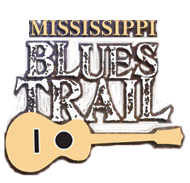Howlin’ Wolf
Howlin’ Wolf - West Point
One of the giants of post-World War II Chicago blues, Chester Arthur Burnett, aka “Howlin’ Wolf,” was born in White Station, just north of West Point, on June 10, 1910. In his early teens Burnett began performing in the Delta and was later a pioneer in electrifying the Delta blues. After moving north, Burnett nonetheless remained a strong presence on the Mississippi blues scene by returning home often for visits and performances.
An imposing figure both physically and artistically, Chester Arthur Burnett was named after U.S. President Chester Arthur. Burnett’s grandfather gave him the nickname “Wolf.” He learned to play a one-string “diddley bow” and harmonica as a child, but his early life was difficult. Cast out by his mother, Burnett lived in White Station with his great uncle until he ran away from home at 13 and hitched a train to the Delta.
On the Young and Morrow plantation near Ruleville he had a warm reunion with his father, who bought him his first guitar in 1928. Burnett soon fell under the wing of blues pioneer Charley Patton, who taught him showmanship and songs that Burnett would later record, including “Pony Blues.” Burnett developed a distinctive style, highlighted by his naturally raspy voice and howling, a technique he developed by trying to imitate Jimmie Rodgers’s signature yodels. As “Howlin’ Wolf” he performed in the region with bluesmen including Johnny Shines, Floyd Jones, Sonny Boy Williamson II, and Robert Johnson. Every spring he returned from his wide travels to plow his father‘s farmland.
After serving in the Army (1941-43), “Wolf” took up farming, and in 1948 moved to West Memphis, Arkansas, where he formed an electric blues band and hosted a radio show on KWEM. Wolf’s music caught the attention of Memphis producer Sam Phillips, who famously recalled: “When I heard Howlin’ Wolf, I said, ‘This is for me. This is where the soul of man never dies.'” Phillips first recorded Wolf in 1951 for the RPM and Chess labels. In 1953 Wolf moved to Chicago, where he continued to record for Chess, waxing classics such as “Spoonful,” “Killing Floor,” “Back Door Man,” “I Ain’t Superstitious,” and “Howlin’ For My Darling” with protégé Hubert Sumlin on guitar.
Wolf’s music reached new audiences in the 1960s, when his songs were covered by artists including Jeff Beck, Jimi Hendrix, the Rolling Stones, Led Zeppelin, Cream, and the Doors. His own 1956 recording “Smokestack Lightnin’” even became a hit on the pop music charts in England in 1964.
Wolf’s music remained popular down South long after he moved to Chicago. He frequently returned to this area to visit friends, hunt and fish, and performed at local venues such as Ferdinand Sykes’s place on Cottrell Street in West Point, Roxy’s juke joint in White Station, and the Chicken Shack in Union Star. He died on January 10, 1976, in Hines, Illinois. West Point established a festival in his honor in 1996 and a museum in 2005.
content © Mississippi Blues Commission
[ BACK TO TOP ]

